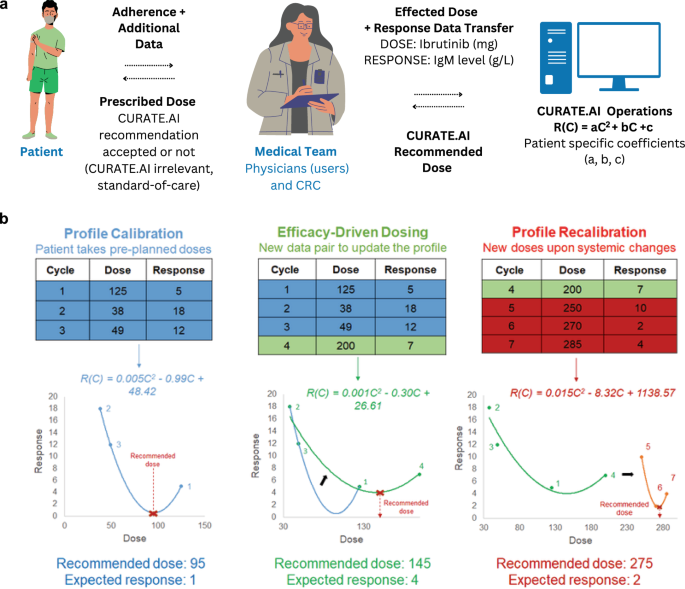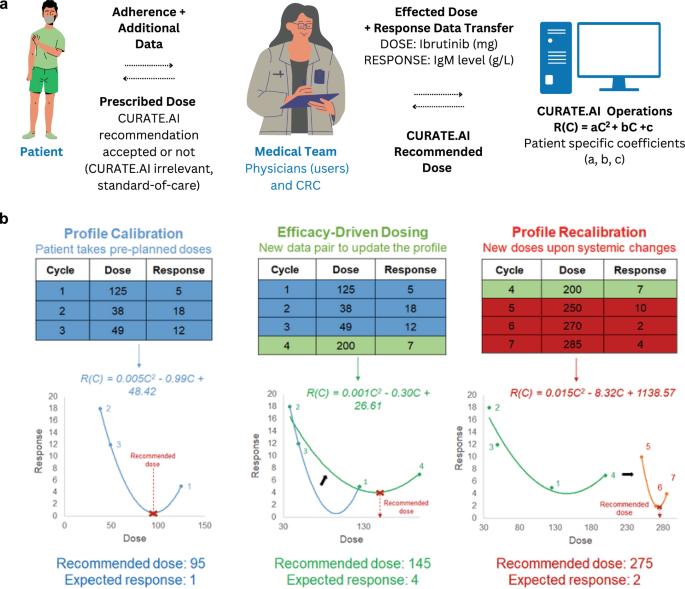Personalized dose selection for the first Waldenström macroglobulinemia patient on the PRECISE CURATE.AI trial
IF 12.4
1区 医学
Q1 HEALTH CARE SCIENCES & SERVICES
引用次数: 0
Abstract
The digital revolution in healthcare, amplified by the COVID-19 pandemic and artificial intelligence (AI) advances, has led to a surge in the development of digital technologies. However, integrating digital health solutions, especially AI-based ones, in rare diseases like Waldenström macroglobulinemia (WM) remains challenging due to limited data, among other factors. CURATE.AI, a clinical decision support system, offers an alternative to big data approaches by calibrating individual treatment profiles based on that individual’s data alone. We present a case study from the PRECISE CURATE.AI trial with a WM patient, where, over two years, CURATE.AI provided dynamic Ibrutinib dose recommendations to clinicians (users) aimed at achieving optimal IgM levels. An 80-year-old male with newly diagnosed WM requiring treatment due to anemia was recruited to the trial for CURATE.AI-based dosing of the Bruton tyrosine kinase inhibitor Ibrutinib. The primary and secondary outcome measures were focused on scientific and logistical feasibility. Preliminary results underscore the platform’s potential in enhancing user and patient engagement, in addition to clinical efficacy. Based on a two-year-long patient enrollment into the CURATE.AI-augmented treatment, this study showcases how AI-enabled tools can support the management of rare diseases, emphasizing the integration of AI to enhance personalized therapy.


为 PRECISE CURATE.AI 试验的首例瓦尔登斯特伦巨球蛋白血症患者进行个性化剂量选择。
在 COVID-19 大流行和人工智能(AI)进步的推动下,医疗保健领域的数字革命引发了数字技术的迅猛发展。然而,由于数据有限等因素,将数字医疗解决方案(尤其是基于人工智能的解决方案)整合到像瓦尔登斯特伦巨球蛋白血症(WM)这样的罕见病中仍具有挑战性。CURATE.AI是一种临床决策支持系统,它提供了大数据方法之外的另一种方法,即仅根据个人数据校准个人治疗档案。我们介绍了 PRECISE CURATE.AI 试验中一位 WM 患者的案例研究,在两年多的时间里,CURATE.AI 为临床医生(用户)提供了动态的伊布替尼剂量建议,旨在达到最佳的 IgM 水平。一名80岁的男性新确诊WM患者因贫血而需要治疗,他被招募参加了基于CURATE.AI的布鲁顿酪氨酸激酶抑制剂伊布替尼剂量试验。主要和次要结果测量侧重于科学和后勤可行性。初步结果表明,除临床疗效外,该平台还具有提高用户和患者参与度的潜力。基于长达两年的CURATE.AI增强治疗的患者注册,这项研究展示了人工智能工具如何支持罕见病的治疗,强调了人工智能与增强个性化治疗的结合。
本文章由计算机程序翻译,如有差异,请以英文原文为准。
求助全文
约1分钟内获得全文
求助全文
来源期刊

NPJ Digital Medicine
Multiple-
CiteScore
25.10
自引率
3.30%
发文量
170
审稿时长
15 weeks
期刊介绍:
npj Digital Medicine is an online open-access journal that focuses on publishing peer-reviewed research in the field of digital medicine. The journal covers various aspects of digital medicine, including the application and implementation of digital and mobile technologies in clinical settings, virtual healthcare, and the use of artificial intelligence and informatics.
The primary goal of the journal is to support innovation and the advancement of healthcare through the integration of new digital and mobile technologies. When determining if a manuscript is suitable for publication, the journal considers four important criteria: novelty, clinical relevance, scientific rigor, and digital innovation.
文献相关原料
| 公司名称 | 产品信息 | 采购帮参考价格 |
|---|
 求助内容:
求助内容: 应助结果提醒方式:
应助结果提醒方式:


